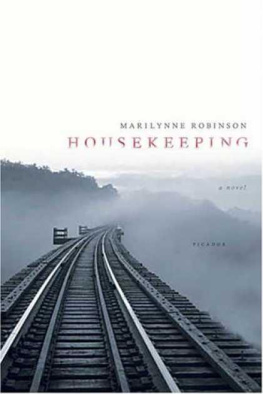Marilynne Robinson - Housekeeping
Here you can read online Marilynne Robinson - Housekeeping full text of the book (entire story) in english for free. Download pdf and epub, get meaning, cover and reviews about this ebook. year: 2004, publisher: Picador, genre: Non-fiction. Description of the work, (preface) as well as reviews are available. Best literature library LitArk.com created for fans of good reading and offers a wide selection of genres:
Romance novel
Science fiction
Adventure
Detective
Science
History
Home and family
Prose
Art
Politics
Computer
Non-fiction
Religion
Business
Children
Humor
Choose a favorite category and find really read worthwhile books. Enjoy immersion in the world of imagination, feel the emotions of the characters or learn something new for yourself, make an fascinating discovery.
- Book:Housekeeping
- Author:
- Publisher:Picador
- Genre:
- Year:2004
- Rating:4 / 5
- Favourites:Add to favourites
- Your mark:
- 80
- 1
- 2
- 3
- 4
- 5
Housekeeping: summary, description and annotation
We offer to read an annotation, description, summary or preface (depends on what the author of the book "Housekeeping" wrote himself). If you haven't found the necessary information about the book — write in the comments, we will try to find it.
Housekeeping — read online for free the complete book (whole text) full work
Below is the text of the book, divided by pages. System saving the place of the last page read, allows you to conveniently read the book "Housekeeping" online for free, without having to search again every time where you left off. Put a bookmark, and you can go to the page where you finished reading at any time.
Font size:
Interval:
Bookmark:
HOUSEKEEPINGby Marilynne Robinson
NEW YORK.
For myhusband,
and jot Jamesand Joseph, Jody and Joel, Your wonderful boys
Farrar, Strausand Giroux 19 Union Square West, New York 10003
Copyright 1980by Marilynne Robinson
All rightsreserved
Distributed inCanada by Douglas & Mcintyre Ltd.
Printed in theUnited States of America
Firstpublished in 1980 by Farrar, Straus and Giroux
Firstpaperback edition, 1997
Eighthprinting, 2001
The Library ofCongress has catalogued the hardcover edition as follows:
Robinson,Marilynne.
Housekeeping.
I. Title.
PS3j68.o3i2jH61981 813'.^4 80-24061
ISBN0-374-17313-3
Housekeeping.
My name isRuth. I grew up with my youngersister, Lucille, under the care of my grandmother, Mrs.
Sylvia Foster,and when she died, of her sisters-in-law, Misses Lily and Nona Foster, and whenthey fled, of her daughter, Mrs. SylviaFisher. Through all these generationsof elders we lived in one house, my grandmother's house, built for her by herhusband, Edmund Foster, an employee of the railroad, who escaped this worldyears before I entered it. It was hewho put us down in this unlikely place. Hehad grown up in the Middle West, in a house dug out of the ground, with windowsjust at earth level and just at eye level, so that from without, the house wasa mere mound, no more a human stronghold than a grave, and from within, theperfect horizontality of the world in that place foreshortened the view soseverely that the horizon seemed to circumscribe the sod house and nothingmore. So my grandfather began to readwhat he could find of travel literature, journals of expeditions to themountains of Africa, to the Alps, the Andes, the Himalayas, the Rockies. He bought a box of colors and copied amagazine lithograph of a Japanese painting of Fujiyama.
He paintedmany more mountains, none of them identifiable, if any of them were real. They were all suave cones or mounds, singleor in heaps or clusters, green, brown, or white, depending on the season, butalways snowcapped, these caps being pink, white, or gold, depending on the timeof day. In one large painting he hadput a bell-shaped mountain in the very foreground and covered it withmeticulously painted trees, each of which stood out at right angles to theground, where it grew exactly as the nap stands out on folded plush. Every tree bore bright fruit, and showybirds nested in the boughs, and every fruit and bird was plumb with the warp inthe earth. Oversized beasts, spottedand striped, could be seen running unimpeded up the right side and un hasteneddown the left. Whether the genius ofthis painting was ignorance or fancy I never could decide.
One spring mygrandfather quit his subterraneous house, walked to the railroad, and took atrain west. He told the ticket agentthat he wanted to go to the mountains, and the man arranged to have him put offhere, which may not have been a malign joke, or a joke at all, since there aremountains, uncountable mountains, and where there are not mountains there arehills. The terrain on which the townitself is built is relatively level, having once belonged to the lake. It seems there was a time when thedimensions of things modified themselves, leaving a number of puzzling margins,as between the mountains as they must have been and the mountains
as they arenow, or between the lake as it once was and the lake as it is now. Sometimes in the spring the old lake willreturn. One will open a cellar door towading boots floating tallowy soles up and planks and buckets bumping at thethreshold, the stairway gone from sight after the second step. The earth will brim, the soil will becomemud and then silty water, and the grass will stand in chill water to its tips. Our house was at the edge of town on alittle hill, so we rarely had more than a black pool in our cellar, with a fewskeletal insects skidding around on it. Anarrow pond would form in the orchard, water clear as air covering grass andblack leaves and fallen branches, all around it black leaves and drenched grassand fallen branches, and on it, slight as an image in an eye, sky, clouds,trees, our hovering faces and our cold hands.
My grandfatherhad a job with the railroad by the time he reached his stop. It seems he was befriended by a conductorof more than ordinary influence. Thejob was not an especially good one. Hewas a watchman, or perhaps a signalman. Atany rate, he went to work at nightfall and walked around until dawn, carrying alamp.
But he was adutiful and industrious worker, and bound to rise. In no more than a decade he was supervisingthe loading and unloading of livestock and freight, and in another six years hewas assistant to the stationmaster.
He held thispost for two years, when, as he was returning from some business in Spokane,his mortal and professional careers ended in a spectacular derailment.
Though it wasreported in newspapers as far away as Denver and St. Paul, it was not, strictlyspeaking, spectacular,
because no onesaw it happen. The disaster took placemidway through a moonless night. Thetrain, which was black and sleek and elegant, and was called the Fireball, hadpulled more than halfway across the bridge when the engine nosed over towardthe lake and then the rest of the train slid after it into the water like aweasel sliding off a rock. A porterand a waiter who were standing at the railing at the rear of the caboosediscussing personal matters (they were distantly related) survived, but theywere not really witnesses in any sense, for the equally sound reasons that thedarkness was impenetrable to any eye and that they had been standing at the endof the train looking back.
People camedown to the water's edge, carrying lamps. Mostof them stood on the shore, where in time they built a fire. But some of the taller boys and younger menwalked out on the railroad bridge with ropes and lanterns. Two or three covered themselves with blackgrease and tied themselves up in rope harnesses, and the others lowered themdown into the water at the place where the porter and the waiter thought thetrain must have disappeared. After twominutes timed on a stopwatch, the ropes were pulled in again and the diverswalked stiff-legged up the pilings, were freed from their ropes and wrapped inblankets. The water was perilouslycold.
Till it wasdawn the divers swung down from the bridge and walked, or were dragged, upagain. A suitcase, a seat cushion, anda lettuce were all they retrieved.
Some of thedivers remembered pushing past debris as they swam down into the water, but thedebris must
have sunkagain, or drifted away in the dark. Bythe time they stopped hoping to find passengers, there was nothing else to besaved, no relics but three, and one of them perishable. They began to speculate that this was notafter all the place where the train left the bridge. There were questions about how the trainwould move through the water. Would itsink like a stone despite its speed, or slide like an eel despite its weight? If it did leave the tracks here, perhaps itcame to rest a hundred feet ahead.
Or again itmight have rolled or slid when it struck bottom, since the bridge pilings wereset in the crest of a chain of flooded hills, which on one side formed the wallof a broad valley (there was another chain of hills twenty miles north, some ofthem islands) and on the other side fell away in cliffs. Apparently these hills were the bank ofstill another lake, and were made of some brittle stone which had been mined bythe water and fallen sheerly away. Ifthe train had gone over on the south side (the testimony of the porter and thewaiter was that it had, but by this time they were credited very little) andhad slid or rolled once or twice, it might have fallen again, farther and muchlonger.
After a whilesome of the younger boys came out on the bridge and began to jump off, at firstcautiously and then almost exuberantly, with whoops of fear. When the sun rose, clouds soaked up thelight like a stain. It became colder. The sun rose higher, and the sky grewbright as tin. The surface of the lakewas very still. As the boys' feetstruck the water, there was a slight sound of rupture. Fragments of transparent ice wobbled on thewaves they made and, when the water was calm again, knitted themselves up likebits of a reflection. One of the
Next pageFont size:
Interval:
Bookmark:
Similar books «Housekeeping»
Look at similar books to Housekeeping. We have selected literature similar in name and meaning in the hope of providing readers with more options to find new, interesting, not yet read works.
Discussion, reviews of the book Housekeeping and just readers' own opinions. Leave your comments, write what you think about the work, its meaning or the main characters. Specify what exactly you liked and what you didn't like, and why you think so.











